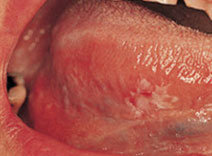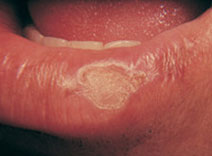Oral cancers can be deadly diseases. Each year in the United States, roughly 45,000 new cases of mouth and throat cancer are diagnosed, and about 13% of people die within the same year they are diagnosed.
Treatment may be more successful with oral cancers that are found early. Your dentist checks for these cancers every time you visit, so this is one more reason to see your dentist regularly.
This brochure will tell you some ways to lower your risk for mouth and throat cancer. And by watching for the signs and symptoms listed here, you are more likely to find the cancer earlier if you do have it.
Below is a list of mouth and throat cancer signs and symptoms. Check your mouth in the mirror each day when you brush and floss. If there are any changes in your mouth or neck, or if you notice any of these signs or symptoms, contact your dentist.
Signs and symptoms of oral (mouth) cancer:
- A sore or irritation that doesn’t go away
- Red or white patches
- Pain, tenderness or numbness in mouth or lips
- A lump, thickening, rough spot, crust or small eroded area
- Difficulty chewing, swallowing, speaking, or moving your jaw or tongue
- A change in the way your teeth fit together when you close your mouth
Throat cancer affecting the base of the tongue and the tonsils.
Anyone can get cancer. There are some factors that you may control – such as smoking cigarettes or chewing tobacco, heavy alcohol consumption, and exposure to the human papillomavirus (HPV) – which increase your risk of developing of developing oral cancer. Below is more information about factors that can affect your chance of developing mouth or throat cancer.
- Infection with HPV is associated with increased risk of developing oral cancers. HPV is very common and many people are not even aware that they have been infected.
- Tobacco associated risk, which includes chewing tobacco or smoking cigarettes, cigars or pipes, is affected by the amount of tobacco you use and the length of time you’ve been doing it. When you quit using tobacco, your risk of developing oral cancer continues to go down. In ten years of being tobacco free, your risk is about the same as someone who never smoked or chewed.
- People who use tobacco products and drink alcohol have a greater chance of developing oral cancer than if they only did one or the other.
- Spending long periods of time in the sun increases your risk of developing higher risk for lip cancer.
- Eating too few fruits and vegetables may increase your risk for developing oral cancer.
- The risk of mouth and throat cancer increases with age. Though not always the case, it can occur more often in people over the age of 40.
During a dental exam, your dentist will check your face, neck and mouth for lumps, red or white patches, and sore areas that do not heal. Your dentist may check you for oral cancer visually, manually, with special screening tools, or with a combination of these methods.
Be sure to tell your dentist if you notice any changes in your mouth and/or neck. If signs of cancer are found early, treatment may be more successful.
Be aware of any changes in your mouth and throat. If you have any concerns about mouth and throat cancer, talk with your dentist. It may help save your life.





